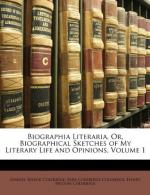
|
| Name: _________________________ | Period: ___________________ |
This test consists of 15 multiple choice questions and 5 short answer questions.
Multiple Choice Questions
1. Coleridge finds that quotable lines are known as such for which reason?
(a) Syntax.
(b) Beauty.
(c) Logic.
(d) Sensibility.
2. What does Coleridge think Wordsworth elevated?
(a) Beauty.
(b) Objects.
(c) People.
(d) Language.
3. Coleridge says that he often disagreed with Wordsorth, but always interpreted his words in which way?
(a) Right.
(b) Wrong.
(c) Naively.
(d) Ignorantly.
4. Coleridge says that a poem should express the tone and spirit of which of the following?
(a) Unity.
(b) Fear.
(c) Literature.
(d) Peace.
5. Coleridge says that a reader should find a poet to be which of the following?
(a) Lonely.
(b) Ambitious.
(c) Fearful.
(d) Enjoyable.
6. Wordsworth's brilliance overcomes which of the following, according to Coleridge?
(a) Bad diction.
(b) Hopelessness.
(c) Defects.
(d) His lack of faith.
7. According to Coleridge, what did Wordsworth give to his poetry?
(a) Meter.
(b) Tone.
(c) Rhyme.
(d) Metaphor.
8. What is the topic of Chapter XVII?
(a) Wordsworth's objective truths.
(b) Rustic lifestyles.
(c) Metrical composition.
(d) Interplay between passion and will.
9. What does Coleridge say appropriateness is an issue in?
(a) Daily life.
(b) Grammar.
(c) Manners.
(d) Poetry.
10. What did Coleridge campaign against in his early years?
(a) Language.
(b) Poverty.
(c) Free speech.
(d) Religion.
11. According to Coleridge, how did Wordsworth do on his experimental poem?
(a) He was ignored.
(b) He neither failed nor succeeded.
(c) He succeeded.
(d) He failed.
12. According to Coleridge, meter results from an interplay between which combination?
(a) Happiness and fruitfulness.
(b) Anger and fear.
(c) Passion and will.
(d) Freedom and innocence.
13. What was the first attack that Coleridge made against?
(a) Catholcism.
(b) England.
(c) Christianity.
(d) Calvinism.
14. Coleridge compares poets of his time to which poets from which country?
(a) France.
(b) Germany.
(c) Spain.
(d) Italy.
15. What does Coleridge describe as two counteracting forces?
(a) Spirit.
(b) Knowledge.
(c) Imagination.
(d) Reality.
Short Answer Questions
1. Coleridge states the idea of God involves which of the following?
2. How does Coleridge describe the idea of poetry?
3. How many motives does Coleridge believe men have?
4. Coleridge says that if poetry is from the poet's sensation, what does the work become?
5. Whose theory of style does Coleridge say it is to use everyday language?
|
This section contains 329 words (approx. 2 pages at 300 words per page) |

|




